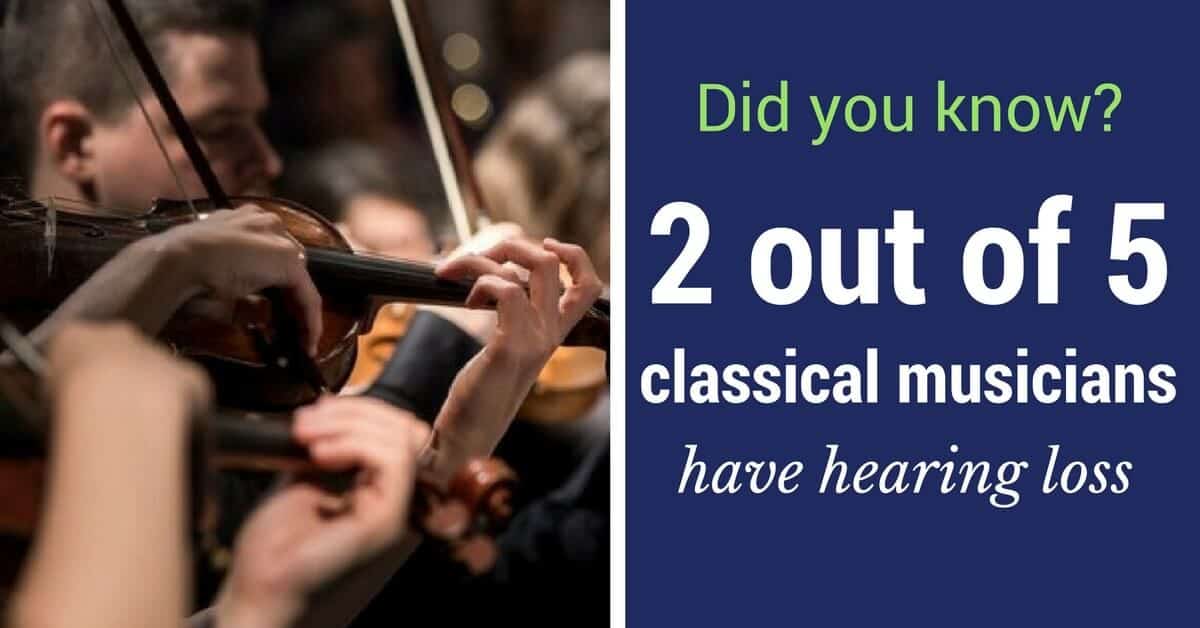We all know that some jobs cause hearing loss. Jobs like manufacturing or construction are notoriously noisy, so it’s little wonder people lose their hearing working in these sectors. The professional you might not realize is at risk of hearing loss is the musician. From stuffy practice rooms to reverberating recording studios and extremely loud concerts, musicians work in dangerously high noise levels every day and are experiencing hearing loss in high numbers.
Noise Induced Hearing Loss
As the most common kind of hearing loss, noise induced hearing loss is damage caused by daily exposure to dangerously high sound levels. Any sounds over 85 decibels (dB) are considered dangerous to your hearing health, and this includes sounds like a lawnmower (100dB), a jackhammer (120dB) and a jet engine (140dB). Even everyday noises like city traffic or your kitchen appliances are louder than 85dB, and are slowly chipping away at your hearing.
Rock Stars
If your blender could damage your hearing, it’s no shock that rock stars often have hearing loss. They’re exposed to sounds over 120dB, and perform in dangerously loud concerts every night. Famous musicians like Pete Townshend from The Who, Eric Clapton, Ozzy Osbourne, and Neil Young all suffer from hearing loss. Last year, Brian Johnson of AC/DC took a hiatus while on tour due to hearing loss. Whether in the recording studio or on stage without ear protection, their music is to blame for their hearing loss.
Classical Musicians and Hearing Loss
Would it surprise you to learn that rock stars aren’t the only ones with hearing loss? Classical musicians also risk hearing loss. In fact, a recent study tested members from one of Norway’s largest orchestras and found that two out of five, or 43% of the musicians in the orchestra had hearing loss! Not only that, but over 75% of the musicians struggled with tinnitus, or an uncomfortable ringing or whistling in the ears. It’s abundantly clear that rock or pop musicians aren’t the only ones at risk of severe hearing loss.
Why Are Classical Musicians at Risk?
While you may not think of classical music as being too loud, and you can listen to it comfortably, that’s not the whole story. The symphony unfolding in front of you at the concert hall is just the final step for these skilled musicians. You can hear the softest sounds from the back of the balcony, now imagine the loudest sounds right next to your ear!
Musicians practice for several hours every day, often at dangerous noise levels of over 85dB. Violins, flutes, horns and many percussion instruments easily hit 100dB even on their own. However, the risk comes not only from your own instrument, but also from those around you. From violas to double bass, each instrument adds its voice, and the clamber on stage can often seem deafening. Imagine sitting in front of the woodwind or brass sections, with high flutes and blaring trumpets, and it’s easy to believe that many classical musicians lose their hearing.
Career on the Line
If you work on the factory floor and don’t have to communicate too much at work, your hearing loss might not get you fired. If you’re a musician though, suffering from hearing loss could spell the end of your career. If you can’t hear all the highs and lows, all the subtleties of the music perfectly, your career may be over. Many of the musicians in the Norwegian orchestra were already beginning to show early signs of hearing loss. The study found that 82% of musicians felt pain in their ears after playing with the orchestra and had temporary or permanent tinnitus. Many also reported sound sensitivity that didn’t end with the end of the rehearsal.
Protecting Hearing
Even though many classical musicians know they’re at risk of hearing loss, they don’t wear hearing protection but allow their hearing to deteriorate. Seventy-percent of the Norwegian musicians said they were concerned about their hearing, yet most did not wear hearing protection when practicing or performing. Magne Nyvoll Temte, who conducted the study, says this is frightening. Once hearing is lost it cannot be restored, and classical musicians aren’t taking precautions to save their hearing. While conventional earplugs might muffle sounds, or be uncomfortable to wear, special hearing protection for musicians is available that is designed for musicians’ unique needs. Always protect your hearing, it’s not worth the risk.
My Hearing Centers
Are you a music lover experiencing changes in your hearing? Reach out to us today.
(888) 230-0875


